Yoga therapy is the process of empowering individuals to progress toward improved health and wellbeing through the application of the teachings and practices of yoga.
“Yoga therapy is the professional application of the principles and practices of yoga to promote health and well-being within a therapeutic relationship that includes personalized assessment, goal setting, lifestyle management and yoga practices for individuals or small groups.” (IAYT).
A Yoga Therapist applies yoga techniques to specific health conditions. A Yoga Therapist, therefore, must be trained in both the techniques (8 limbs of yoga ) as well as the therapeutic applications of these techniques.
This point in time represents an exciting opportunity for yoga therapy! Though based on a long tradition of healing, yoga therapy is a relatively new profession gaining awareness and recognition as an effective healing modality.
Yoga therapy is easily integrated with other healing modalities, used in conjunction with western medical practices, and practiced as a stand-alone therapy.
As a Yoga Therapist, you are trained to meet your client where they are and support their individual healing and wellness needs regardless of age, gender, condition, health history, physical or mental ability.
Yoga Therapists help clients to heal any number of physical conditions such as back pain, shoulder injury, sciatica, pelvic floor dysfunction, and plantar fasciitis. They also have therapeutic practices to address anxiety disorders, PTSD, insomnia, depression, autoimmune diseases, addiction, obesity, cancer support, and more.

Program Overview
Through our comprehensive 800-hour curriculum, practicum and individual mentoring, our training offers an opportunity for thorough grounding in the therapeutic application of yoga. Students will gain knowledge of evidence informed practices and to skillfully adapt the tools of yoga therapy to the individual needs of the client or specific group.
Our program supports IAYT’s educational standards for yoga therapy. We received accreditation for our program on January 21, 2024, from IAYT.
We offer two (2) streams of certification:
- A 300-hour Yoga Therapy – Foundation certificate program for Yoga Teachers to build their foundation on the path to becoming a Yoga Therapist.
- An 800-hour Yoga Therapist certificate program that consists of the 300-hour Yoga Therapy – Foundation certificate program plus a 500-hour Yoga Therapy – Advanced Program and Practicum.

Yoga Therapy – Foundation
A 300-hour certificate program for Yoga Teachers to build the foundation on the path to becoming a Yoga Therapist. This is the first component in our 800-hour Yoga Therapy Program.
This 300-hour component must be completed before continuing to the Yoga Therapy – Advanced Module and the Yoga Therapy – Practicum (800-hour Yoga Therapy Program)
Yoga Therapy – Foundation provides an overview of the yoga therapy field. Students start to build their yoga therapy foundation, including an introduction to current scientific research on yoga therapy. Students learn about the philosophy and evolution of yoga therapy in India and in the West, as well as the various tools used in yoga therapy, such as asana, pranayama, mudra, yoga nidra, guided relaxation, and visualisation.
Students explore lifestyle-related diseases and common mental health disorders and the therapeutic approach for healing through yoga, and assessing for imbalances. Further familiarization and integration of biomechanics and somatic movement occurs , as well as an introduction to the principles of Ayurveda as they relate to yoga therapy.
Students learn to translate the principles and skills of the therapeutic relationship for practice in a one-on-one setting with clients and how to facilitate individual and group experiences that are safe, confidential, reliable, and consistent with appropriate and clear boundaries.
Note: Course hours do not include homework or personal practice time.
Wednesdays: 6 pm ET – 9 pm ET each evening
Instructor: Devinder and Lynda
Introduction to Yoga Therapy
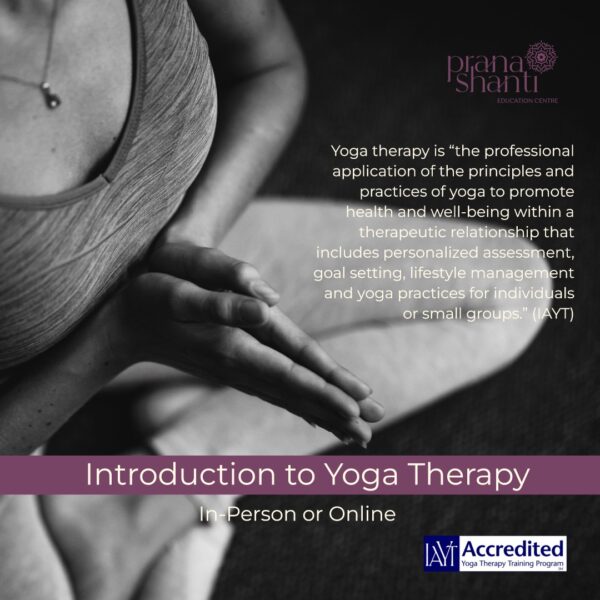
For ALL Yoga Teachers and Students!
A Yoga Therapist is trained in the skills and practices needed for the therapeutic application of yoga principles and practices, for example asana, pranayama, the five koshas model, meditation, and understanding of yoga philosophy for self-awareness. This point in time represents an exciting opportunity for yoga therapy! Yoga therapy is a relatively new profession that is gaining awareness and recognition as an effective healing modality. Yoga therapy is integrative and complements other healing modalities, including Western practices.
A Yoga Therapist may be one part of a person’s health and healing team. Yoga Therapists are trained to meet their client where they are and support their individual healing and wellness needs regardless of age, gender, health history, physical, or mental ability. Yoga Therapy supports physical, energetic, emotional, spiritual, and mental well-being.
This course is the first course in the 800 Hour PranaShanti Yoga Therapy Program and is designed to introduce students to the foundations of Yoga Therapy, the role of the Yoga Therapist, the International Association of Yoga Therapists (IAYT), and to PranaShanti’s Yoga Therapy Program.
Learning Objectives:
|
|
|
|
IAYT Competencies: 3.3, 3.4, 5.2, 5.3, 5.4
|
|
|
There are no additional fees, books, supply costs or other additional expenses beyond the course fee for this course.
Tuesdays (5): 6 pm ET – 9 pm ET
Instructor: Stephanie
Advanced Anatomy and Biomechanics
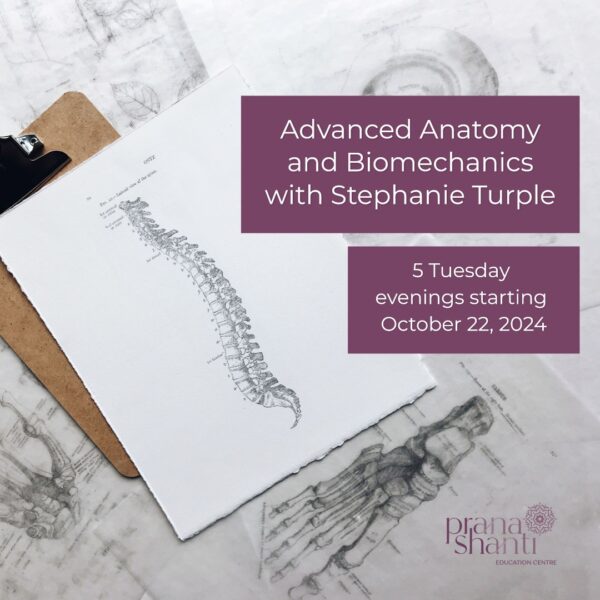 Familiarity with how our bodies are put together, how their different systems function, and the mechanics of how they move can deepen our understanding of how to practice yoga safely, effectively, and efficiently. Learning anatomy, biomechanics and physiology can help us prevent injury, maintain a healthy, mobile body over our lifetime, and become more effective yoga teachers.
Familiarity with how our bodies are put together, how their different systems function, and the mechanics of how they move can deepen our understanding of how to practice yoga safely, effectively, and efficiently. Learning anatomy, biomechanics and physiology can help us prevent injury, maintain a healthy, mobile body over our lifetime, and become more effective yoga teachers.
In this course, we’ll examine Western anatomy through the lens of yoga by studying and applying to practice the following:
- The ten systems of the body and how yoga can positively affect them
- The anatomy and biomechanics of the breath and their central importance in how we practice asana and breathwork
- The anatomy of the spine and how to practice asana safely and effectively by utilizing the biomechanics of the spine
- The anatomy of the major joints of the body, the five primary causes of joint pain, and how yoga can help maintain healthy joints
This course will be a combination of lecture and applied practice of what we study so that students complete this course with a sense that knowledge of Western anatomy isn’t only information on a page but living, breathing concepts that can be practically applied to our yoga practice and teaching.
There is no pre-reading required for this course. Handouts for each subject will be distributed prior to our weekly sessions.
Learning Objectives:
|
|
|
Competencies: 2.1, 2.2
Learning Materials:
|
|
|
There are no additional fees, books, supply costs or other additional expenses beyond the course fee for this course.
Assessment:
Pre-course reading assignment that is discussed during course. Informal Observation: In-session. Open-ended Questions: In-session. Small Group Exercises: Pairs and triads reporting back to full group. Series of quizzes: In-session.
Friday: 6 pm ET – 9 pm ET
Saturday and Sunday: 10 am ET – 5 pm ET
Instructor: Sonia
Principles and Practices of Ayurveda
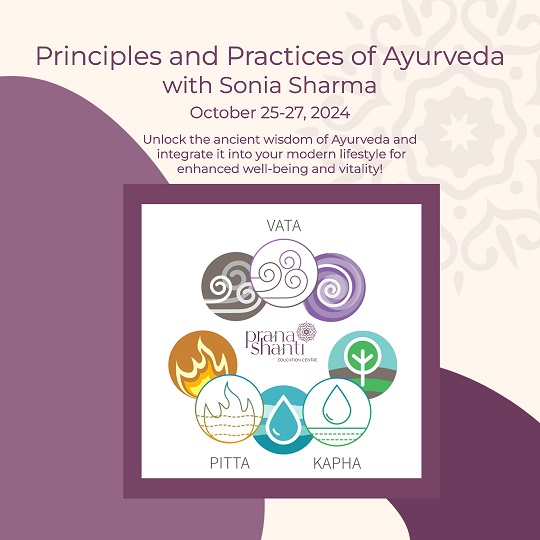
Learn the core concepts of Ayurveda, an ancient tradition of healing, to enhance well-being and energy for the mind, body and soul.
|
|
|
|
|
|
|
|
Wednesday to Sunday: 9 am ET – 6 pm ET each day
Instructor: Katherine and Michael
Yoga Therapy for Mental Health – Part 1
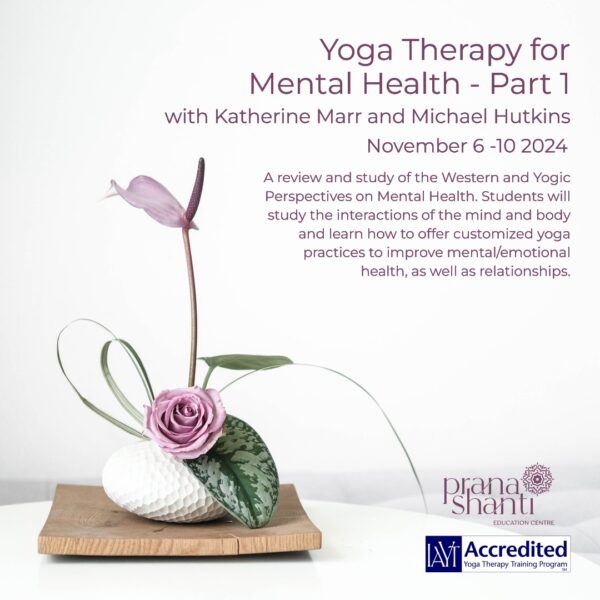 A review and study of the Western and Yogic Perspectives on Mental Health including common psychological conditions such as Depression, Anxiety, Bi-polar, Psychosis, Schizophrenia, Addiction and Eating Disorders. We will also explore how neuroplasticity and yoga therapy practices can be introduced to elicit positive neuro-cognitive changes. An overview of the Western Psychological treatments for mental health including Cognitive Behavioural therapy, Group Therapy, Interpersonal Psychotherapy and Somatic Therapy are presented.
A review and study of the Western and Yogic Perspectives on Mental Health including common psychological conditions such as Depression, Anxiety, Bi-polar, Psychosis, Schizophrenia, Addiction and Eating Disorders. We will also explore how neuroplasticity and yoga therapy practices can be introduced to elicit positive neuro-cognitive changes. An overview of the Western Psychological treatments for mental health including Cognitive Behavioural therapy, Group Therapy, Interpersonal Psychotherapy and Somatic Therapy are presented.
Yogic Theories of the five Kleshas, Dukha (suffering), and Daurmanasya (negative thinking) will be explained through the tools of yoga therapy. Students will study the interactions of the mind and body and learn how to offer customized yoga practices to improve mental/emotional health, as well as relationships.
This course focuses on the manomaya, vijnanamaya and anandamaya koshas; which provide a framework to evaluate and understand the multidimensional nature of the human mind and its relationship with other subtle body systems. Basic knowledge of commonly occurring mental health conditions—from psychological distress to psychiatric conditions—their symptoms, and common approaches/interventions, as they relate to the work of a yoga therapist will be covered.
Learning Objectives:
|
|
|
|
Competencies: 1.2, 1.3, 2.3, 3.1
Learning Materials:
|
|
|
There are no additional fees, books, supply costs or other additional expenses beyond the course fee for this course.
Assessment:
Pre-course reading assignment that is discussed during course. Informal Observation: In-session. Open-ended Questions: In-session. Self-reflective Exercise/Journal Reflection. Homework: Written assignment with a 400–600-word summary essay. Case Study.
Friday and Saturday: 9 am ET – 5 pm ET
Sunday: 9 am ET – 3 pm ET
Instructor: Devinder
Meditation Training
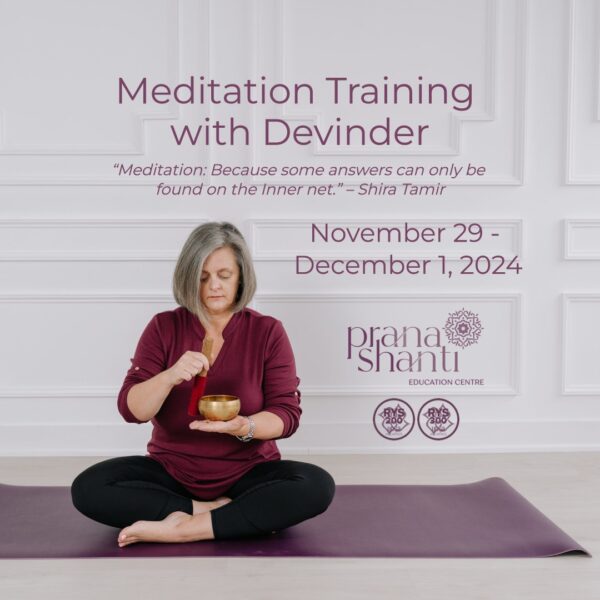
“Meditation: Because some answers can only be found on the Inner net.” – Shira Tamir
|
|
|
|
|
|
|
|
Friday: 6 pm ET – 9 pm ET
Saturday and Sunday: 9 am ET – 6 pm ET
Instructor: Monique and Devinder
Lifecycles, Relationships and the Path to Well-Being
 This course explores imbalances that can negatively affect a client’s mental/emotional/energetic health. Various models will be explored as methods to assess relationship health such as the 7 yajna model, chakra system and yamas/niyamas.
This course explores imbalances that can negatively affect a client’s mental/emotional/energetic health. Various models will be explored as methods to assess relationship health such as the 7 yajna model, chakra system and yamas/niyamas.
Based on these mind-body assessments, students will learn how to work with their clients to develop yoga therapy practices to improve inter-personal relationships. Students will review the basic principles of a therapeutic relationship, taking into consideration the scope of practice for yoga therapists when addressing relationship imbalances.
Models of human development, including developmental stages, lifecycles, and personality, and their importance to medical and psychological health and well-being will be discussed. Familiarity with the influence of familial, social, cultural, and religious conditioning on mental and medical perspectives of health and healing. Knowledge of the interaction of the body, breath, mind, intellect, and emotions in health and well-being will be included.
Learning Objectives:
|
|
|
|
Competencies: 2.4, 2.5, 3.1
Learning Materials:
- PranaShanti Course PowerPoint Slide Package
- Yoga Therapy Foundations, Tools, and Practice: A Comprehensive Textbook by by Matra Raj (Foreword), Melinda Atkins (Contributor), Sundar Balasubramanian (Contributor), Marsha D. Banks-Harold (Contributor), Judi Bar (Contributor), Kelli Bethel (Contributor), and numerous other contributors, Laurie Hyland Robertson (Editor), Diane Finlayson (Editor)
- The Yamas and Niyamas: Exploring Yoga’s Ethical Practice by Adele Deborah. (Optional: To be purchased/provided by the student.)
There are no additional fees, books, supply costs or other additional expenses beyond the course fee for this course.
Assessment:
Informal Observation: In-session. Open-ended Questions: In-session. Self-reflective Exercise/Journal Reflection. Homework: Comprehensive research case study assignment.
Friday: 6 pm ET – 9 pm ET
Saturday and Sunday: 9 am ET – 6 pm ET
Instructor: Bonney, Devinder and Katherine
Framework for Health and Disease
 Understand the concept or framework of health and disease from the perspective of yoga and Ayurveda then apply this to a holistic model of yoga therapy that incorporates vayus, chakras and pancamaya kosha theory. Examine and analyse current yoga therapy research and learn how yoga therapy can support specific health concerns, including muscular-skeletal injury, athletes, stress-related illness, chronic fatigue, fibromyalgia, asthma, heart disease and cancer.
Understand the concept or framework of health and disease from the perspective of yoga and Ayurveda then apply this to a holistic model of yoga therapy that incorporates vayus, chakras and pancamaya kosha theory. Examine and analyse current yoga therapy research and learn how yoga therapy can support specific health concerns, including muscular-skeletal injury, athletes, stress-related illness, chronic fatigue, fibromyalgia, asthma, heart disease and cancer.
Review the scientific evidence that demonstrates the impact of yoga and meditation on physiology and supports their use as an intervention for health maintenance and recovery.
Gain an in depth knowledge on the categorisation of illness, including the development/evolution of disease (samprapti [pathogenisis]), including but not limited to direction, intensity, onset, and duration and their influence on the ease or difficulty of healing and disease management; the setting of priorities: symptoms/pacification (shamana [short term]) and purification/strengthening (shodhana [long term]).
This course also explores the public health perspective to empower yoga therapists with language to advocate for yoga therapy services within health systems.
Learning Objectives:
|
|
|
|
|
Competencies: 1.3, 2.1, 2.2, 2.4
Learning Materials:
|
|
|
There are no additional fees, books, supply costs or other additional expenses beyond the course fee for this course.
Assessment:
Informal Observation: In-session. Open-ended Questions: In-session. Small Group Exercises: Pairs and triads reporting back to full group. Quiz: In-session. Homework: Series of questions to be answered in writing.
Friday: 6 pm ET – 9 pm ET
Saturday and Sunday: 9 am ET – 6 pm ET
Instructor: Monique
Principles and Skills for Educating Clients/Groups
You will learn how to design and conduct private yoga therapy sessions, including how to do yoga therapy intakes, what to look for during your intake, and how to create a yoga therapy sequence unique to the needs of your client.
This is a comprehensive exploration in adaptation of yoga sequences to meet the needs of the individuals using the tools of asana, pranayama and dhyanam. Focused attention is on the assessment of an individual needs using the lens of the panchamaya model. Development of specific goals for the individual client is addressed using the principles of vinyasa krama to move the client forward in a sustainable and appropriate manner.
This course consists of experiential group practice teaching to assess the ability to design and execute safe yoga therapy sequences. This course provides the foundations that the yoga therapist – client relationship is the basis, the very core, of all yoga therapy treatment approaches regardless of the specific aim. It introduces the fundamentals of the very first process between yoga therapist and client that the yoga therapist is entering into a relationship with the client that essentially is safe, confidential, reliable, and consistent with appropriate and clear boundaries.
The principles of a therapeutic yoga therapist-client relationship have specific goals and functions that will be discussed and analyzed through case studies and group discussion.
- In-depth knowledge of and demonstrated ability to implement effective teaching methods, adapt to unique styles of learning, provide supportive and effective feedback, acknowledge the client’s/student’s progress, and cope with unique difficulties/successes.
- In-depth knowledge of and demonstrated ability to transmit the value of selfawareness and self- responsibility throughout the therapeutic process.
- In-depth knowledge of and demonstrated ability to develop and adjust appropriate practice strategies to the client/student.
- In-depth knowledge of how to translate practicum preparation, such as clinical observation of yoga therapy sessions, role playing and case study into effective practicum delivery.
Learning Objectives:
|
|
|
|
|
Competencies: 1.3, 3.2, 3.3, 3.4
Learning Materials:
|
|
|
|
There are no additional fees, books, supply costs or other additional expenses beyond the course fee for this course.
Assessment:
Pre-course reading assignment that is discussed during course. Informal Observation: In-session. Open-ended Questions: In-session. Small Group Exercises: Role playing – pairs and triads reporting back to full group. Self-reflective Exercise/Journal Reflection. Homework: Written assignment with a 400-600 word summary essay. Case Study.
Click to learn more or to register
Energetic Anatomy of Yoga – 20 hours
Everything is energy, including us. As solid and dense as our physical bodies may seem, when we observe the very particles that make up matter, atoms, we find mostly empty space.
What is this space comprised of? What is the animating force that underlies physical reality, and can we become aware of and consciously direct this energy for greater health, emotional balance, mental well-being and spiritual development? The state of our energy or subtle body affects everything from our physical health to our emotional and mental well-being, our sense of connection with others and the clarity (or lack thereof) of our purpose in life.
This course is designed to introduce a deeper understanding of the our subtle anatomy and how to integrate thses into your yoga practice and teaching.
Learning Objectives:
|
|
|
|
Competencies: 1.1, 1.2, 1.3, 2.3, 2.5, 3.1
Learning Materials:
|
|
|
|
There are no additional fees, books, supply costs or other additional expenses beyond the course fee for this course.
Assessment:
Pre-course reading assignment that is discussed during course. Informal Observation: In-session. Open-ended Questions: In-session. Small Group Exercises: Pairs and triads reporting back to full group. Self-reflective Exercise/Journal Reflection. Homework: Series of questions to be answered in writing.
Click to learn more or to register
Friday: 6 pm ET – 9 pm ET
Saturday and Sunday: 9 am ET – 6 pm ET
Instructor: Devinder
Principles of Ayurveda – Advanced
Advanced Ayurveda is an in-depth study of the TriDosha (Vata, Pitta, Kapha) and TriGuna (Sattva, Rajas, Tamas) in relation to Rasa (taste), Prakruiti (constitution) and Vikruti (condition).
Through the deep understanding of the 5 Great Elements and 20 Qualities, you will be able to define the effects of substances and their ability to cause balance or imbalance. Advanced study of the 3 Energies and the role they play in every substance, thought and activity we expose ourselves to develops the ability to become a Master of Doshic balance. This develops the ability to apply the science in the scope of their practice for the betterment of their own lives as well as the lives of others.
Learn to embody the words of Hippocrates when he said, “let thy food be thy medicine, and thy medicine be thy food.” Learn to evaluate any given food item offered and the potential benefit or harm resulting from the individual’s consumption. This course also includes a take home guide to use for everyday wellness including over 20 common culinary herbs available in any grocery store to restore balance and bring delicious flavor to your way of life.
This course introduces the Ayurvedic concept of Samprapti; the six stages of the disease process. It includes an in depth, yet easy to understand study of how a state of dis-ease comes to the body. The approach is through an advancing understanding of the Dhatus; 7 bodily tissues and the pathway of substances through the bodily system. To prevent, halt, reverse, or manage this process the concept of Chikitsa, or treatment will be introduced. You will gain life changing knowledge in the areas of Panchakarma (cleansing/clearing actions), Dravyaguna (herbal remedies), and Rasayana (rejuvenation).
Hands-on techniques for treatments that you can easily perform on yourself others for health and well-being will be covered. Through practicum exercises, you will learn simple Abyangha (massage) techniques to relieve tissues and stimulate Marma (vital points).
Learning Objectives:
|
|
|
|
|
|
|
Competencies: 1.1, 1.2, 1.3, 3.1
Learning Materials:
|
|
|
|
There are no additional fees, books, supply costs or other additional expenses beyond the course fee for this course.
Assessment:
Informal Observation: In-session. Open-ended Questions: In-session. Small Group Exercises: Pairs and triads reporting back to full group. Practicum. Homework: Series of questions to be answered in writing. Exam.
Click to learn more or to register
Tuesdays: 6 pm ET – 9 pm ET each evening
Instructor: Stephanie
Biomechanics and Movement
This course provides an anatomy review that includes the key functional movement principles of biomechanics, and major components of the musculoskeletal system. The focus is on exploring planes of action, understanding appropriate terminology, and developing the tools to assess their client’s structural alignment and movement patterns.
We will also look at the development of appropriate practices to increase structural integrity, modifications to meet the needs of the individual, and how to predict and minimize risks of asana practice. In addition, attention is given to the development of a language for communicating observations to both clients and medical professionals.
This course provides a comprehensive exploration of the application of therapeutic tools to address conditions associated with the musculoskeletal system that includes muscles, tendons, ligaments, joints, and the skeleton. The focus will be on the study of how conscious biomechanical actions influence unconscious physiological responses.
Students will learn about observing musculoskeletal ailments, charting progress using SOAP notes, read and interpret doctor’s reports, synthesize intakes and assessments, and apply customized practices for specific musculoskeletal conditions.
Learning Objectives:
|
|
|
|
|
Competencies: 2.1, 2.4, 2.5
Learning Materials:
|
|
|
|
There are no additional fees, books, supply costs or other additional expenses beyond the course fee for this course.
Assessment:
Pre-course reading assignment that is discussed during course. Informal Observation: In-session. Open-ended Questions: In-session. Small Group Exercises: Pairs and triads reporting back to full group. Quiz: In-session.
Click to learn more or to register
Wednesday to Sunday: 9 am ET – 6 pm ET each day
Instructor: Monique and Bonney
Principles of the Therapeutic Relationship, Ethical and Therapist Considerations
Private yoga therapy sessions require a unique set of skills. Yoga Therapists need to be able to adjust to unique needs of each client, and to be able to develop a relationship with their clients.
In this course you will learn and practice listening, presence, directive and non-directive dialogue. We will explore the dynamics of the therapeutic relationship and learn how to create a safe and welcoming space. Understand ethics as applied to the practice of yoga therapy including: scope of practice, boundaries, the changing therapeutic relationship and the need for referral to other professional services. The role of self-reflection, selfawareness and peer support are addressed. Explore successful strategies for marketing as a professional Yoga Therapist.
Trainees learn how to build a community of practice and write a marketing plan for their business. Develop the skills necessary to manage the business aspect of being a practicing Yoga Therapist including writing a business plan, setting a fee structure, record keeping and accounting practices.
The field of Yoga Therapy is growing, evolving and becoming more widely recognized as an important part of holistic, complementary health care. Yoga Therapy training’s teach students how to be of service to their communities but rarely touch on how to navigate the world of business to ensure their own sustainability.
Learning Objectives:
|
|
|
|
|
Competencies: 1.3, 3.2, 3.3, 3.4, 5.1, 5.2, 5.3, 5.4
Learning Materials:
|
|
|
|
|
There are no additional fees, books, supply costs or other additional expenses beyond the course fee for this course.
Assessment:
Pre-course reading assignment that is discussed during course. Informal Observation: In-session. Open-ended Questions: In-session. Small Group Exercises: Role playing – pairs and triads reporting back to full group. Self-reflective Exercise/Journal Reflection. Homework: Written assignment with a 400-600 word summary essay. Case Study.
Click to learn more or to register
Instructor: Katherine
Yoga Therapy Philosophy and Methodology
This course introduces the basic guiding philosophies and methodologies of yoga including it roots, lineages and originating philosophy. Discover the evolution of the teachings and philosophy of the yoga tradition; The Yoga Sutras on Healing, Lessons from Patanjali, and their relevance and application to yoga therapy, including teachings from Vedic and post-Vedic periods, Samkhya, Yoga, Tantra, and Ayurveda are introduced. Learn how the Yoga tradition is woven into Yoga Therapy through group discussions, readings and individual exploration.
Learning Objectives:
|
|
|
|
Competencies: 1.1, 1.2, 3.3, 3.4, 5.2, 5.3, 5.4
Learning Materials:
|
|
There are no additional fees, books, supply costs or other additional expenses beyond the course fee for this course.
Assessment:
Informal Observation: In-session. Open-ended Questions: In-session. Small Group Exercises: Pairs and triads reporting back to full group. Self-reflective Exercise/Journal Reflection. Homework: Series of questions to be answered in writing.
Friday: 6 pm ET – 9 pm ET
Saturday and Sunday: 9 am ET – 6 pm ET
Instructor: Devinder and Lynda
Principles of Yoga Therapy
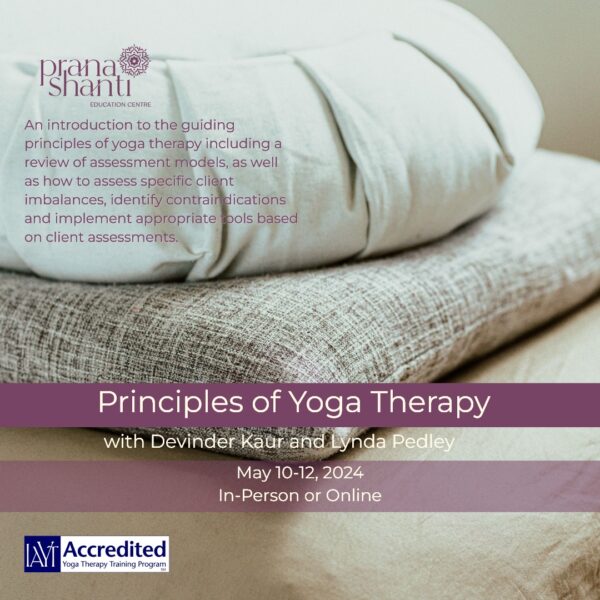 An introduction to the guiding principles of yoga therapy including a review of assessment models ) as well as how to assess specific client imbalances, identify contraindications and implement appropriate tools based on client assessments.
An introduction to the guiding principles of yoga therapy including a review of assessment models ) as well as how to assess specific client imbalances, identify contraindications and implement appropriate tools based on client assessments.
Learn general yoga therapy practices for common conditions such as: low back ailments, heart disease, respiratory/energetic imbalances, addiction, obesity/digestive ailments and relationship issues.
Students will gain knowledge of the risk factors that influence health behaviors and how yoga therapy intervention programs can be applied to improve health outcomes for specific conditions. In addition, students will be introduced to the basic principles of developing a therapeutic relationship as well as how to apply such principles in practice.
Learning Objectives:
|
|
|
|
|
Competencies: 3.1, 3.2, 3.3, 3.4, 5.2, 5.3, 5.4
Learning Materials:
|
|
There are no additional fees, books, supply costs or other additional expenses beyond the course fee for this course.
Assessment:
Pre-course reading assignment that is discussed during course. Informal Observation: In-session. Open-ended Questions: In-session. Small Group Exercises: Pairs and triads reporting back to full group. Case Study. Homework: Series of questions to be answered in writing.
Yoga Therapy – Advanced
This 500-hour component consists of required courses, a College/University level Anatomy and Physiology Course and Practicum which are to be started after successful completion of the 300-Hour Yoga Therapy – Foundation program.
In Yoga Therapy – Advanced students gain a basic understanding of many of the more common manifestations of disease in the West, including conditions such as Diabetes, Autoimmune Disorders, Cancer, Respiratory Illnesses, Parkinson’s, Dementia, and Alzheimer’s and we examine the use of therapeutic yoga tools that address these conditions. Focus will be placed on posture modifications and adaptations for physical limitations, range of motion and to support physical body rehabilitation. With instruction in concepts of motion students will learn how to assess for structural imbalances and design an appropriate yoga therapy session to bring balance to the body.
We also explore the application of yoga therapy in the mental health field and how to use yoga for Trauma, Anxiety, Grief, PTSD, and Addiction as applicable to adults and teens. Using case studies, experiential practice, discussion and demonstrations, students gain an understanding of the scope of practice for yoga therapy in medical and clinic settings while learning how to navigate the world of Western medicine as an alternative wellness practitioner.
Note: Course hours do not include homework or personal practice time.
Applied Yoga Philosophy
How does yogic philosophy fit into Yoga Therapy? This course examines teachings and the philosophy of the yoga tradition from the Vedic age to the present. We explore the philosophy of yoga therapy based on the principle branches of yoga including Hatha, Raja, Karma, Jnana, and Bhakti Yoga.
Through our study of the principle branches of yoga and foundational texts such as the Upanishads, Bhagavad Gita, Samkya Karika, and the Yoga Sutras, we learn how to integrate these teachings into our personal and professional practices.
Learning Objectives:
|
|
|
|
Competencies: 1.1, 1.2, 3.1, 5.1
Learning Materials:
|
|
|
There are no additional fees, books, supply costs or other additional expenses beyond the course fee for this course.
Assessment:
Pre-course reading assignment that is discussed during course. Informal Observation: In-session. Open-ended Questions: In-session. Small Group Exercises: Pairs and triads reporting back to full group. Self-reflective Exercise/Journal Reflection. Homework: Written assignment with a 1,500-2,000-word essay. Presentations are made by the students and feedback is given by the faculty.
Click to learn more or to register
Yoga Therapy Tools for Common Conditions
This course will offer an exploration into the Inner Vayu practice and how to use the vayus to deepen your awareness of alignment of posture on and off the mat. The inner alignment of the vayus can to release holdings for yoga therapy clients.
Students will learn how to use the vayus in pranayama to create emotional well-being for the body, mind and spirit. We will apply the theory of the vayus to individual and group yoga therapy sessions.
General guidelines to deal with specific common illness/special situations will be discussed in detail with special focus on Cancer, Trauma, Back Issues, Diabetes, Depression, Auto Immune Disorders, Yoga Therapy for women during each stage of transition. Also discussed will be commonly used drugs and surgical procedures, as relevant to the work of a yoga therapist and common medical terminology.
Knowledge of how to reference current healthcare information relevant to the work of a yoga therapist, including pathologies, disorders, drugs, and surgical procedures, as relevant to the work of a yoga therapist.
Learning Objectives:
|
|
|
|
Competencies: 1.3, 2.2, 3.1, 3.2, 3.3, 5.1
Learning Materials:
|
|
|
|
|
There are no additional fees, books, supply costs or other additional expenses beyond the course fee for this course.
Assessment:
Informal Observation: In-session. Open-ended Questions: In-session. Practice Teaching with Feedback. Small Group Exercises: Pairs and triads reporting back to full group. Case Studies, Group Project.
Click to learn more or to register
Friday: 6 pm ET – 9 pm ET
Saturday and Sunday: 9 am ET – 6 pm ET each day
Instructor: Lynda, Katherine and Bonney
Principles and Skills for Working with Clients and Groups
Yoga therapy requires a unique set of tools. Group yoga therapy classes are sequenced very differently from regular yoga classes. Yoga therapists need to be able to listen and understand verbal and non-verbal cues and language, and to be able to adapt sequencing to meet the individual needs of their clients in a group setting.
In this course, we will learn the sequencing principles of group yoga therapy classes, with a particular focus on designing, implementing and evaluating group yoga therapy series. Focus is on understanding the multidimensional health needs of specific populations; which include: clients experiencing cancer, menopause, fertility related issues, clients with disabilities, family members / caretakers, children with special needs and clients at end of life. Students will gain knowledge of the specific imbalances affecting these various groups, learn how to assess and identify primary and secondary imbalances, as well as synthesize this information to develop a therapeutic plan.
Learn how to a complete a comprehensive assessment, form a treatment plan, and track progress over time. Explore interview techniques for changing health behavior and the influence of social determinants of illness and health. Explore the yogic understanding of the process of change and the therapeutic relationship. Students will gain knowledge of how to build inter-professional, collaborative relationships with other healthcare professionals.
Learning Objectives:
|
|
|
|
|
Competencies: 1.3, 2.1, 2.2, 3.2, 3.3, 3.4, 5.2, 5.3, 5.4
Learning Materials:
|
|
|
|
There are no additional fees, books, supply costs or other additional expenses beyond the course fee for this course.
Assessment:
Informal Observation: In-session. Open-ended Questions: In-session. Practice Teaching with Feedback. Small Group Exercises: Pairs and triads reporting back to full group. Case Studies, Group Project.
Click to learn more or to register
Yoga Therapy and Mental Health – Part 2
This course builds on Part 1 to further explore the complex nature of the human mind in much greater depth with an emphasis on pathology and treatment.
Students will gain knowledge of the underlying, correlating factors and side effects of conditions such as depression, anxiety, addiction, grief, traumatic injuries, chronic pain and mental obstacles from a yoga perspective. Students will learn how to assess, analyze such conditions, utilize the Vyuda model and apply deliberate yogic practices for individuals or groups.
Students will learn to correctly apply the following tools to improve subtle body imbalances including: asana, pranayama, dhynam, guided imagery, and cultivating listening and presence as a yoga therapist. An emphasis will be placed on positive psychology practices; which are backed by evidence-based research and specifically designed to shift ones mindset from negative self-limiting beliefs to a positive mindset.
Learning Objectives:
|
|
|
|
|
Competencies: 1.2, 2.2, 2.3, 2.4
Learning Materials:
|
|
|
|
|
There are no additional fees, books, supply costs or other additional expenses beyond the course fee for this course.
Assessment:
Informal Observation: In-session. Open-ended Questions: In-session. Practice Teaching with Feedback. Small Group Exercises: Pairs and triads reporting back to full group. Case Studies, Group Project.
Click to learn more or to register
Trauma-Informed Practice
Holding space is a continual learning process, and an environment is not a “safe space” just because a facilitator says so. Although teachers and other wellness practitioners show up with positive intent, offerings may have an unexpected impact. Many folks do not feel welcome, face obstacles of all kinds, and are sometimes adversely affected by what happens in yoga and mindfulness classes.
Through discussion about the dynamics of power and privilege, participants will learn more about systems of oppression and pathways to collective liberation to offer yoga in a way that honours the tradition and celebrates the full spectrum of human diversity. By understanding the connections between social justice, trauma and yoga, we can take skillful action.
Participants will develop a trauma-informed lens and come away with resources to integrate into their own lives and to support the well-being of others. This course is an experiential learning opportunity designed to build on current capacities and empower sustainable service.
Learning Objectives:
|
|
|
|
Competencies: 1.3, 2.3, 2.5, 3.2, 3.3, 3.4
Learning Materials:
|
|
|
|
|
There are no additional fees, books, supply costs or other additional expenses beyond the course fee for this course.
Assessment:
Pre-course reading assignment that is discussed during course. Informal Observation: In-session. Open-ended Questions: In-session. Practice Teaching with Feedback. Small Group Exercises: Pairs and triads reporting back to full group. Group Project.
Click to learn more or to register
Myofascial Lines and Asana
Learn and understand the fascial layers of the body. Learn how the fascial system helps us to understand movement patterns and restrictions, how the body is connected and how specific movement and breath tools such as the Tensegrity Repair Series, Restorative Yoga and Somatics can help yoga therapy clients.
Learning Objectives:
|
|
|
Competencies: 1.3, 2.1, 3.1
Learning Materials:
|
|
|
|
|
There are no additional fees, books, supply costs or other additional expenses beyond the course fee for this course.
Assessment:
Pre-course reading assignment that is discussed during course. Informal Observation: In-session. Open-ended Questions: In-session. Practice Teaching with Feedback. Small Group Exercises: Pairs and triads reporting back to full group. Case Study. Homework: Series of questions to be answered in writing.
Click to learn more or to register
Asana Adaptations and Adjustments for Creating Balance
An exploration of the 5 categories of asana (standing poses, forward bends, backbends, twists and inversions) focused on the physiological outcomes of different practices and modifications for specific health conditions.
For each of the types of postures presented, attention to common misalignments, possible health conditions, and probable imbalances that require critical thinking skills in developing appropriate modifications or sequences. The objective is to gain the skills and abilities to modify specific asana to meet the needs of the individual as well as how to regress and progress asana in therapeutic settings. Included is a review of common musculoskeletal injuries and focuses on the tools to enable you to see more of what a client experiencing.
One of the most valuable skills a yoga therapist can have is the skill of observation. Observation techniques that encompass the static and kinesthetic components to our understanding of what we observe is going on in an individual’s body. The skill of observation develops the ability to identify postures and muscle recruitment patterns that may cause faulty postures, repetitive strain, overstretching, low back pain, and energy inefficiency.
Learning Objectives:
|
|
|
Competencies: 1.3, 2.2, 3.1
Learning Materials:
|
|
|
|
|
There are no additional fees, books, supply costs or other additional expenses beyond the course fee for this course.
Assessment:
Pre-course reading assignment that is discussed during course. Informal Observation: In-session. Open-ended Questions: In-session. Practice Teaching with Feedback. Small Group Exercises: Pairs and triads reporting back to full group. Case Studies.
Click to learn more or to register
Pelvic Health & Yoga Therapy
Only recently, pelvic floor or pelvic health has started to become a more common topic. Perhaps you heard about it and are curious to learn more. Or maybe you have dealt with pelvic issues of your own or know someone who has.
This course is designed to bring awareness and dispel myths, plus simple practices that can help alleviate symptoms, prevent future issues, and overall lead to better health and quality of life!
Learning Objectives:
|
|
|
|
Competencies: 1.3, 2.1, 3.1
Learning Materials:
|
|
|
There are no additional fees, books, supply costs or other additional expenses beyond the course fee for this course.
Assessment:
Informal Observation: In-session. Open-ended Questions: In-session. Small Group Exercises: Pairs and triads reporting back to full group. Quiz.
Click to learn more or to register
Chronic Pain & Yoga Therapy
Yoga therapists require an understanding of the pathophysiology of common disease processes in order to provide individualized yoga instructions and ensure the safety of students and clients.
Equally important is a clear understanding of tissue healing and the neurophysiology of pain.
Explore common injuries, diseases and pain from a bio psychosocial perspective. This knowledge will be integrated with the wisdom of yoga, enhancing and broadening your perspective of yoga as a preventative and rehabilitative modality. Explore the interplay of the physiology and yogic psychology of stress, inflammation, pain and sleep and their role in health and illness.
Learning Objectives:
|
|
|
|
Competencies: 1.3, 2.1, 3.1
Learning Materials:
|
|
|
|
There are no additional fees, books, supply costs or other additional expenses beyond the course fee for this course.
Assessment:
Pre-course reading assignment that is discussed during course. Informal Observation: In-session. Open-ended Questions: In-session. Practice Teaching with Feedback. Small Group Exercises: Pairs and triads reporting back to full group. Case Study.
Click to learn more or to register
Body & Mind Integration
A study and investigation into the Western scientific perspectives on the mind and the brain. Topics include neuroplasticity and how yoga therapy practices can be introduced to elicit positive neurocognitive changes. An emphasis will be placed on positive psychology practices; which are backed by evidence-based research and specifically designed to shift ones mindset from negative self-limiting beliefs to a positive mindset.
Students will study the interactions of the mind and body and learn how to offer customized yoga practices to improve mental/emotional health, as well as relationships.
Learning Objectives:
|
|
|
|
Competencies: 1.2, 2.1, 2.3, 2.5, 3.1
Learning Materials:
|
|
|
There are no additional fees, books, supply costs or other additional expenses beyond the course fee for this course.
Assessment:
Informal Observation: In-session. Open-ended Questions: In-session. Practice Teaching with Feedback. Small Group Exercises: Pairs and triads reporting back to full group. Quiz.
Click to learn more or to register
Completion of a College or University level Anatomy and Physiology course.
Learning Objectives:
|
|
|
|
|
|
Competencies: 2.1
Learning Materials: As determined by the College or University
Assessment: As determined by the College or University
A list of suggested courses can be provided. For example: Algonquin College
Yoga Therapy – Practicum
The Yoga Therapy – Practicum can be started after successful completion of the Yoga Therapy – Foundation component.
Upon registration for the module, students will be paired with a mentor. Our mentors are experienced yoga therapists and graduates of an IAYT approved 800-hour Yoga Therapy Program. The mentors also help guide the student through their coursework via email, telephone, Zoom, or in-person meetings if they live near each another.
The practicum is 220 total hours and consists of the following:
The 180 hours consists of the delivery of individual and group yoga therapy sessions in real time.
Program details
TRAINING TEAM
Faculty:
- Devinder Kaur: MBA, E-RYT 500, YACEP, C-IAYT
- Katherine Marr: MA, CCC, RP, C-IAYT
- Melissa Delaney: MA, RYT, C-IAYT
- Lynda Pedley: MBA, E-RYT 500, YACEP, C-IAYT, CPT, PCC
- Monique Newton: E-RYT200, RYT500, YACEP, MPA, TPN, C-IAYT
- Bonney Elliot: M.Ed, RP, NP, RYT, CCC-S, SEP
- Michael Hutkins: E-RYT 500, YACEP, C-IAYT
School and Program Director: Devinder Kaur (devinder@pranashanti.com)
Program Co-ordinator: Shannon Dobson (shannon@pranashanti.com)
Pre-requisites
Be at least 18 years of age;
Have a high school diploma or equivalent;
Have a 200-hour yoga teaching certificate from a Yoga Alliance registered school;
Have at least one (1) year of teaching experience;
Have at least one (1) year of personal practice;
Complete the Program Application which includes an interview with the Program Director and Program Co-ordinator.
Transfer Credits
We welcome transfer students from C-IAYT Training Programs subject to review of program content and alignment with our structure and up to a maximum of 300 hours. We look forward to discussing this with you to understand how your already completed course align with our courses.
A number of the course modules from our 300-hour Hatha Yoga Teacher Training Program are transferable into the program. They are as follows:
- Advanced Anatomy and Biomechanics – 20 hours
- Principles of Ayurveda – Foundation – 20 hours
- Meditation Training – 20 hours
- Yoga of the Subtle Body/Energetic Anatomy of Yoga – 20 hours
- Yoga for Everybody and Trauma Informed Practice – 20 hours
Note: The total maximum transfer hours from all sources cannot exceed 600 hours. Prerequisite hours are ineligible as transfer hours.
TUITION FEES
- Yoga Therapy Foundation: Fees are paid per course and is approximately $6,500.00 + HST for the 300 Hour program;
- Yoga Therapy Advanced: Fees are paid per course and is approximately $4,500.00 + HST, for the 225 Hour program;
- Yoga Therapy Practicum: $1,500.00 + HST, 220 Hours
- Total Program: $12,500.00 + HST, 800 Hours plus your own fee paid for the Anatomy and Physiology Course.
Application Process
We are currently accepting applications for the Program!
- Complete the Application Form;
- Submit a Personal Statement as to why you would like to take part in the Program;
- Provide three (3) letters of recommendation-two (2) professional and one (1) personal;
- Provide a copy of the 200 hour Yoga Teacher Training Certificate;
- Participate in a one-on-one interview with the Program Co-ordinator;
- Once accepted, there is a $250.00 + tax Registration Fee to confirm placement in the program.
Yoga Therapy Certificate Graduation Requirements
We offer 2 streams of study, Yoga Therapy – Foundation and Yoga Therapy – Advanced, whichever stream is selected, attendance at all modules is required.
All modules must be completed in a maximum of five years. If you are unable to attend a course, you may attend the same course the next time it is offered.
Students must fully engage in each course. During courses, students are required to actively take part in and complete the group and partner work, practice teachings, written and homework assignments.
Completion of a College or University level Anatomy and Physiology course and completion of the 220-hour practicum is required for the 800-hour Yoga Therapy – Advanced Yoga Therapist certificate program.
